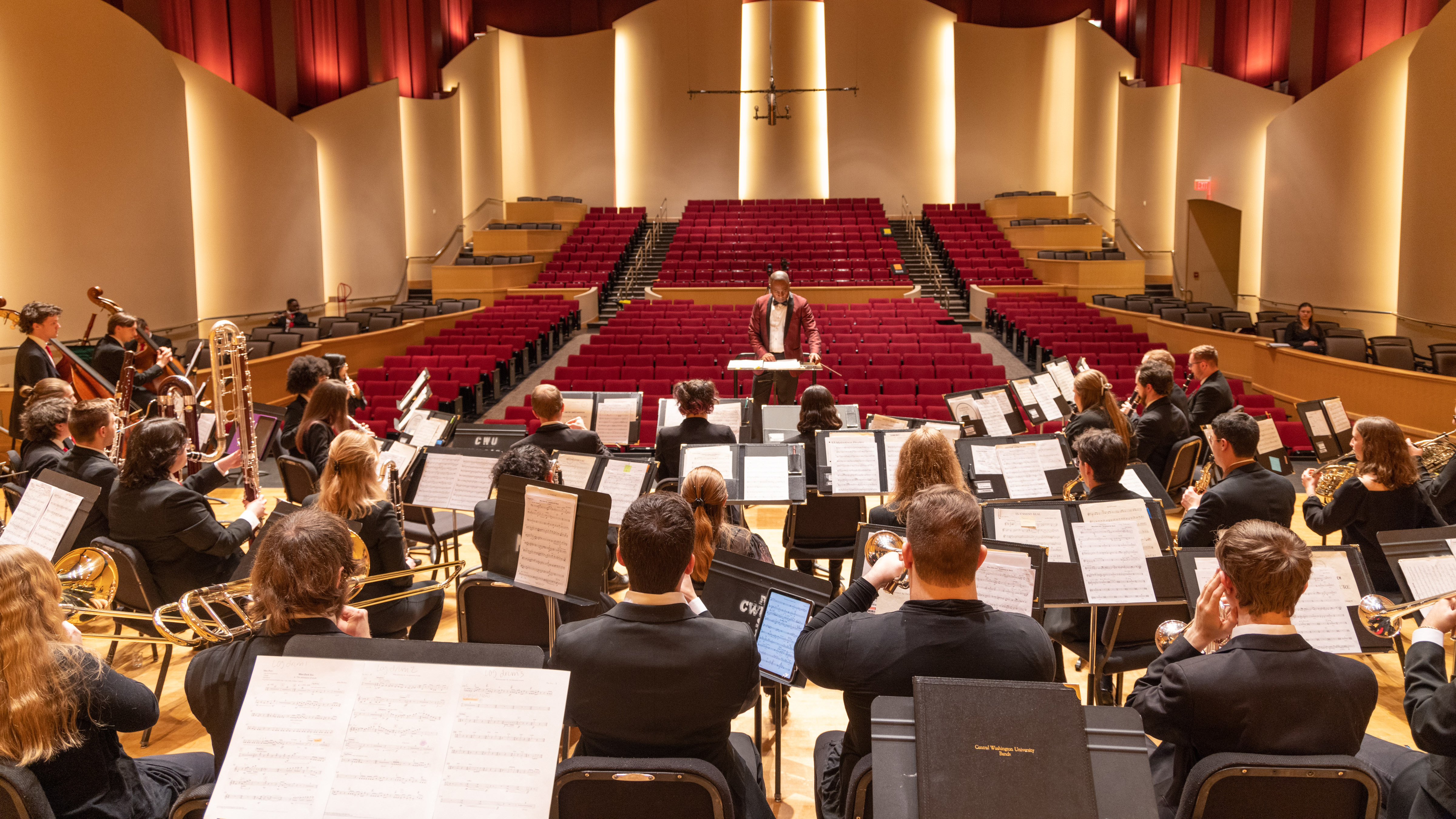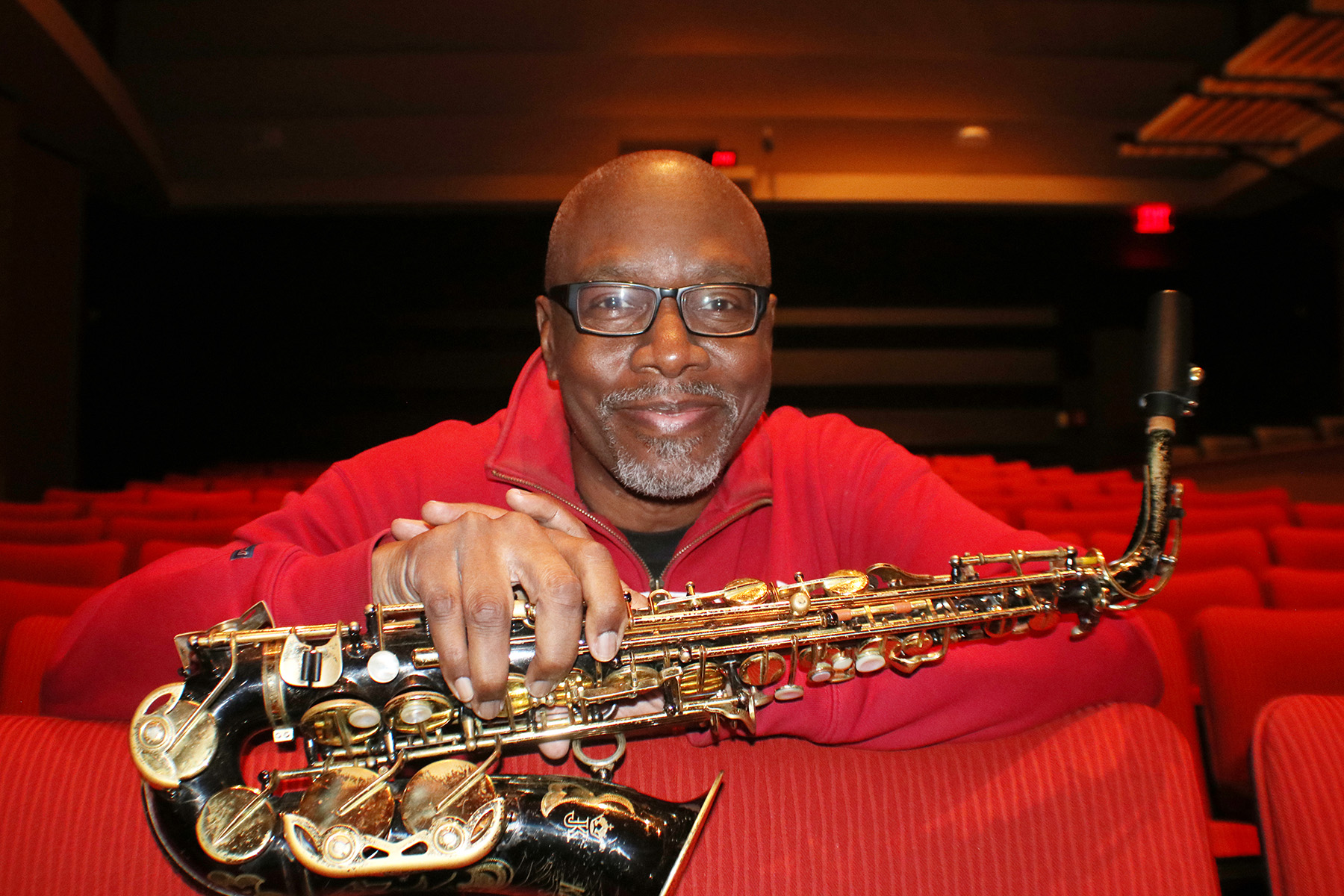
Music
Voice Audition Requirements
General Audition Information
In order to study voice at CWU, you must first audition for the music faculty. This step is required to complete your acceptance into the CWU Department of Music program. This audition gives us an opportunity to hear the level you have achieved in your musical skills and it gives you the opportunity to discuss your development with collegiate instructors. Performance entrance standards may be found at the bottom of the page.
How and When to Set up an Audition
First preference for admittance to the program and scholarship awards will be given to students who audition before February 1st. Follow the instructions on our Music Program Auditions & Admissions page.
Please consider visiting campus on your audition day or another day later in the spring if you can’t audition in person. A campus visit gives you a chance to sit in on rehearsals, classes and lessons to develop a feel for what the building, faculty and students are like. You'll be much better prepared to make the important decision about your college choice if you have visited us and experienced what we do!
Undergraduate Requirements for the Voice Area Audition
All students interested in pursuing voice as their primary instrument should prepare
- One Major scale on either solfege or scale degree numbers
- A one octave chromatic scale
- Recommended Starting pitches:
- Lower voices: start on A flat
- Middle voices: start on C
- Higher voices: start on E flat
- Recommended Starting pitches:
- Any starting pitch is acceptable and should be based on your comfort.
- Two songs or arias (one in a world language if possible.)
- A musical theater selection can be substituted for the classical style English song. We do not need to hear a jazz selection at this audition and other contemporary styles (rock, pop styles) are not preferred.
- Even though auditions are only 10 minutes long we will ask you to tell us a bit about yourself and why you want to pursue a music degree. We will try to answer your questions during this time as well or connect you to other faculty that can help you.
- Students may be asked to demonstrate basic musicianship skills in sight-singing, piano competency or aural recognition. Students are not required to show mastery of these skills, but the faculty will consider the overall level of musicianship for each student along with vocal potential and previous training in a holistic approach for admission to the degree programs
* An accompanist will be available at the auditions. Please bring legible music (in the correct key) with you.
* Please arrive at least 10 minutes prior to the scheduled audition time to fill out some additional information for the faculty.
Audition Helpful Hints:
- Select music that best displays your performance level. Don't try to wow us with repertoire that is very difficult. We would much prefer to hear you sing a simple song very well than sing a difficult song poorly.
- We strongly recommend you prepare your audition material under the supervision of your private teacher and/or music director.
- Please bring legible music for the accompanist. Check that all the lines of the music are there and nothing got cut off. Also, please do not bring the music on your iPad for the accompanist to use or copies of music that is gray or fuzzy because it is a copy of a scan. Ideally, the music should be in a book that stays open or in a binder to facilitate page turns. Loose sheets of music often blow away on the piano!
- Dress as if you were going to a job interview. You want to present yourself well as a future professional. Jeans and sneakers do not create a confident and professional impression.
If you have any questions about the audition process, please email Dr. Melissa Schiel.
Large Ensemble Audition Requirements
All CWU vocal ensembles are open to music majors and non-majors. If you do not plan to pursue a music degree you do not need to schedule an audition before you arrive at Central for classes. Ensemble auditions are held during the first few days of school at the beginning of the year. For more information visit the visit the Choral Pages. The University Chorale, Vox Divina and The Wildcat Chorus do not require an audition. Please contact Dr. Nicole Lamartine or visit our Choral Ensembles page more information.
Graduate Student Vocal Audition Requirements
Central has a long history of excellence in vocal music. At the graduate level we offer a MMUS degree in Vocal Performance, the MMUS in Vocal Pedagogy and a cognate (similar to a minor for undergraduate studies) in Performance or Vocal Pedagogy.
MM in Vocal Performance Audition Requirements:
- Five songs:
- Including at least one operatic aria
- in at least three different languages, one of which may be English
- Non-native speakers of English must perform one piece in English
- If your degree choice is MM - Pedagogy, you also need to submit a written paper on a music subject to verify writing ability.
Expectations upon admission for all MM vocal students:
- You should have performed at least one half of a full baccalaureate recital as an undergraduate.
- You must have taken at least one college year of German or French. If not, you would be expected to take one or the other of those languages here.
- Music Theory and Music History diagnostic exams will be offered at the beginning of the first quarter of graduate study. Please consult the Graduate Student Handbook for more information regarding core music requirements.
If you are interested in applying for a Graduate Assistantship you can find information on our Graduate Teaching Assistants page.
Should you have other questions please do not hesitate to contact Dr. Melissa Schiel.
Entrance Standards - Voice
-
CWU Expectations for 164 Level Achievement:
Technical and artistic goals
The main purpose of study at this level is to establish correctly the basic elements of your vocal technique. The correctness of the way you produce sound should take precedence, if necessary, over issues of musical correctness. This is not to say that a great amount of musical sloppiness and ineptitude will be overlooked. However, it is often necessary at this level to overlook issues of performance practice as they relate to the musical style of specific periods.
The student may be given music to sing which does not greatly challenge his/her theatrical flair, or the extremes of range, or even the agility of the voice. This is because the student’s singing, at this level, should be evaluated foremost for evidence that good vocal habits are becoming established, habits which can lead to the optimal development of your voice. Many times, young singers are able to perform in ways that greatly over-reach their technical skill, simply by virtue of “natural talent.” Natural talent is a wonderful (and probably necessary) asset, but, ultimately, will not carry a singer through a career unless a solid grounding in the basics is achieved.
Literature
There should be no rigid limits on the repertoire used at the 164 level. However, in keeping with the considerations stated above, the minimum that has been established is six songs (two each quarter) with about half in English and half in Italian. English songs are used, naturally, because the student already knows that language. Italian is the proper second language for several reasons: The rules of pronunciation are fairly simple, there is a very “singable” ratio between vowel sounds and consonant sounds, and it was the language in which bel canto was developed (to name but a few.)
The English songs used normally come from either Early English or 20th Century American and English sources. Sometimes folk song arrangements are also used. The Italian songs are normally selected from collections such as the Schirmer 24 Italian Songs and Arias of the 17th and 18th Centuries, or the more recently published 26 Italian Songs and Arias, published by Alfred Publishing Co. We also use the edition that we are able to print from a disc set that the Department has.
Of course, 164-level students may study more than six songs in three quarters (a vocal performance major normally will.) Also, a student who has previously studied either French or German might be encouraged to undertake a simple song in that language. However, neither of these things will be done at the expense of taking care of the business at hand, which is to establish vocal habits that will lead to the optimal development of the voice.
-
CWU Expectations for 264 Level Achievement:
Music 264
To place into 264, the transfer student presents a repertoire list of the six (or more) songs studied while at the equivalent level from the transferring institution and that were performed for memory. The student will perform at least two songs for memory at the audition. If the student meets the technical and artistic goals listed above and the applied instructor approves the repertoire list, a student might begin vocal study at the 264 level.
Technical and artistic goals
At this level, the purposes of study increase. The student’s technique will be addressed as a continuation of the basics established at the 164 level. Musical issues— being aware of style, addressing increasingly complex music, giving greater attention to musical nuance—will begin to become integrated with purely vocal issues. Repertoire will increase to nine selections minimum (three per quarter) and include an additional language. In most cases, something from the opera or oratorio aria literature will be studied. The student should also study recitative style at this level. In the song literature, the representation of diverse styles should be broadened.
The additional language will normally be German. This is for several reasons: (1) The German art song literature is more extensive than the French, making for a more varied selection to accommodate a wider variety of voices as they become more apparent at this level. (2) Though the periods when the different language songs were written overlap, the German art song literature generally comes from an earlier period than the French. Accordingly, the musical language is less chromatic and rhythmically varied, the poetry more direct. (3) Though pronunciation of German is more complex than of Italian, it is nonetheless simple compared to French. Taken collectively, these factors render dealing with German diction and style less of a distraction from still-developing vocal technique than dealing with French diction and style.
As at the 164 level, there will be exceptions. There will be students who have studied French previously, and for them, the degree of challenge represented by the two languages might be reversed. In the matter of opera and oratorio arias, it might very well occur that, because of voice type, a specific aria, in whichever language, might be preferable to all others at this stage of development.
Literature
An array of literature to be studied and mastered during three quarters at the 264 level might look something like this:
Two or three art songs by British and American composers, including both early and recent works (perhaps an Elizabethan lute song or two, along with Quilter or Vaughan Williams, or Barber or Copland.)
A recitative and/or aria from one of Handel’s oratorios, such as Messiah.
An Early Italian song (something a bit more demanding than what was addressed at 164), a song by Donaudy or Tosti, and an aria from one of Mozart’s Italian operas, complete with recitative.
Two or three German Lieder by Mozart, Beethoven, Schubert, Schumann, or Brahms.
-
CWU Expectations for 364 Level Achievement
Music 364
To place into 364, the transfer student must provide a repertoire list of at least 9 songs studied at 264, at least six of which are memorized. The list should also include at least 6 songs studied at the 164 level, so a total of at least 15 songs studied during the two year period. The list will demonstrate the type of language and stylistic diversity described above. If a student wishes to be placed directly into the 364 level, a minimum of four memorized songs in at least 3 languages should be prepared for the audition. At this level, more emphasis should be placed upon actually performing the music, as compared to the 164 level, where the primary goal was to demonstrate the presence of good habits forming the foundation of a growing vocal technique. If the applied instructor agrees that the student demonstrates the appropriate level of performance practice and technique and the student has adequate repertoire prepared, a student might be placed directly into the 364 level.
Technical and artistic goals
At this level, the fourth language—either French or German, whichever was not addressed at the 264 level—should be addressed. Technical progress will continue to advance. The student will be expected to become more independent in preparing (and in some cases selecting) literature. As our policy stands at the present time, there is no increase in the required number of pieces between the 264 and 364 levels. The increase comes in the difficulty and sophistication of the pieces.
Literature
In most cases, literature in the Italian language will become more advanced in terms of the vocal skill and maturity required to sing it. Literature in English, German, and French will expand to include the more subtle and difficult styles of the late 19th century and 20th century (and hopefully, some things from the 21st century are beginning to be included.)
An array of literature to be studied and mastered during three quarters at the 364 level might look something like this:
English arias from oratorios by Handel, Haydn, or Mendelssohn, and songs by composers such as Britten, or Ives, or Argento
Arias from Italian operas by Rossini, Verdi, or Puccini
German Lieder by Brahms, Wolf, Strauss, or Berg
French mélodies by Fauré, Duparc, Debussy, or Poulenc
Perhaps an additional aria in any of these languages
A half recital is required of all vocal students at the end of the 364 level. For music education majors the half-recital is the culminating musical performance for the degree, and for the performance majors the half-recital is in preparation for advancement to the 464 level.
-
CWU Expectations for 464 Level Achievement
Music 464
It is unlikely that any student would transfer into CWU at the 464 level of applied lessons. Music Education majors are only required to meet the 364 level in their major performance area so there is no need to transfer to the 464 level. A performance major wishing to enter at the 464 level would need to exhibit the essential characteristics of performance by a music professional: solid technical skills integrated with musical awareness to produce an artistic result at a live audition. Any student requesting the 464 level of applied voice, must provide proof of a public half-recital performance meeting the above repertoire requirements and be prepared to sing any selection from that recital (roughly 20 minutes of music) at the audition.
Expectations
A student at this level will give a full recital. It is therefore to be expected that literature (which may at times include some re-working of pieces from earlier study) will be selected which will (1) form coherent groupings for the purpose of the recital, and (2) be especially well suited to the particular vocal and interpretive strengths of the student as those qualities have by now emerged.
The 464-level student is still an undergraduate. It would therefore be most exceptional if the student were to attempt to become a specialist (e.g., specialize in singing Early Music, or Avant Garde 20th and 21st Century music.) Such would be contrary to the essential philosophy of our program, which seeks to develop the undergraduate student to his/her fullest singing potential commensurate with age and both vocal and musical development at the time of this level of study. Therefore, literature should continue to include a broad range of language and style.
Mid- year jury performance at the 464 level should demonstrate not just the solid technical skills and musical awareness of any music professional, but should affirm the work of a singer in command of a well-developed voice—one who would be recognized not for mere competency, but for superior voice and singing ability.
CWU News

Online Master’s of Education program now offers special education endorsement
May 15, 2024
by Rune Torgersen

Lenny Price brings Detroit perspective to CWU Jazz
May 15, 2024
by University Relations